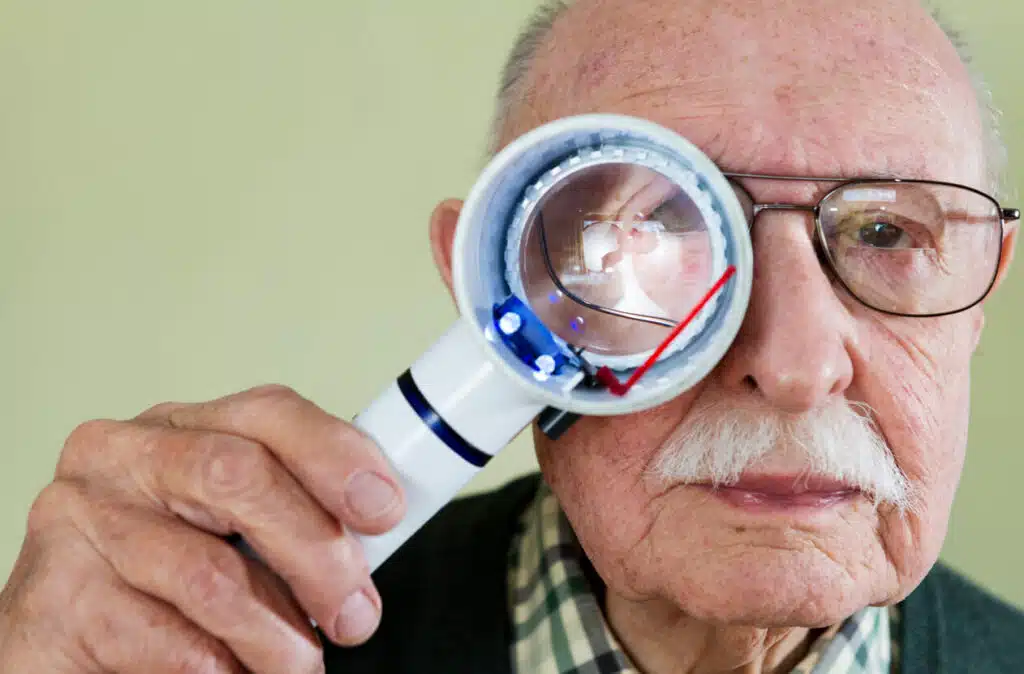
Diabetes is a serious health concern, especially for older adults. People with diabetes need to manage their blood sugar, diet, and more to prevent severe eye conditions such as diabetic retinopathy and macular degeneration. At Advanced Sight Center, our professional team is committed to offering advanced care and treatment options.
In this blog, we will look at ways diabetics can manage their condition to maintain their best eye health.
What Is Diabetic Retinopathy?
Retinopathy is a complication of diabetes which affects the health of the eyes and vision itself. It consists of progressive damage to the blood vessels in the retina at the back of the eye. The retina captures the light that enters your eye and sends the signal to the brain, which interprets this as an image. Early on, diabetic retinopathy may have no symptoms at all or cause only mild vision problems.
However, if not diagnosed and treated, it can lead to blindness. In fact, most cases of legal blindness are due to diabetic retinopathy.
Risk Factors for and Symptoms of Diabetic Retinopathy
High blood glucose levels are largely responsible for the development of diabetic retinopathy. Other risk factors for retinopathy are high blood pressure and smoking.
Symptoms of retinopathy can include:
- Blurry vision
- Seeing floaters, or spots, in the field of vision
- Problems with color vision
- Difficulty seeing at night
However, in the early stages of this eye condition, people may have no symptoms whatsoever. So, regular eye exams are very important for diabetics, with either type 1 or type 2 diabetes.
What Is Macular Degeneration?
Macular degeneration is an age-related condition affecting the part of the retina which creates sharp central vision. This eye structure is called the macula. Because diabetes can damage the retina, it may also damage the blood vessels in the macula, causing them to function poorly.
There are two types of macular degeneration: dry and wet. Dry macular degeneration is the most common form and occurs when the macula becomes too dry and thin. Wet macular degeneration occurs when abnormal blood vessels grow under the retina and leak fluid, damaging the macula.
Risk Factors for and Symptoms of Macular Degeneration
The biggest risk factor for macular degeneration is advancing age. The older you are, the more likely you are to develop this problem. Other risk factors include a family history of the disease, smoking, being overweight and of course, diabetes.
Symptoms can include:
- Blurry or distorted vision
- Difficulty seeing fine details
- Dark or empty spots in central vision
- Changes in color perception
As with diabetic retinopathy, regular eye exams are key to early detection and treatment of macular degeneration.
How Can Controlling Diabetes Help Prevent Retinopathy and Macular Degeneration?
Managing your diabetes can help prevent or manage both diabetic retinopathy and macular degeneration. Here are some ways to control your diabetes to preserve your precious vision.
Blood Sugar Control
Keep your blood sugar levels within the target range. This reduces the risk of damage to sensitive blood vessels in the retina. Additionally, keep track of your blood pressure and weight. Use your diabetic medications as prescribed. Tell your primary care provider (PCP) and eye doctor about any changes in your vision immediately.
Regular Eye Exams
At Advanced Sight Center, our physician team includes a top-notch retina specialist, a cataract and refractive surgery expert and an optometrist for your corrective lens needs. All of them are dedicated to providing the latest diabetes management techniques and treatments. Care plans are highly individualized for each and every patient.
Healthy Lifestyle
A healthy diet and regular physical activity can help manage blood sugar levels and reduce the risk of eye complications. Colorful fruits and dark, leafy vegetables are proven to support eye health and clear vision.
Also, avoid cigarettes. Smoking greatly increases the risk of developing macular degeneration and other eye diseases. If you are a smoker, ask your primary care physician about doing a monitored smoking cessation program. Ongoing support in achieving a tobacco-free lifestyle will help you quit the habit.
Macular Degeneration and Diabetic Retinopathy Treatment in Washington, MO
Effective diabetic management helps avoid severe eye conditions such diabetic retinopathy, macular degeneration, glaucoma and more. By controlling blood sugar levels, maintaining a healthy lifestyle and getting regular medical eye exams, you may reduce your risk of these debilitating conditions.
At Advanced Sight Center, our team is here to support you with the latest diabetes management techniques and vision treatments. For more information about our services or to book an appointment, call us at (636) 239-1650. Also, you can request a visit by filling in our online form here.
Take the first step towards better eye health! Contact Advanced Sight Center in Washington, MO, today.




